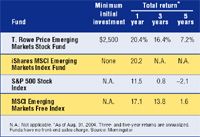Article
Funds of the Month
Author(s):
Emerging-market funds
What they offerA chance to snare markedly high returns and diversify your portfolio with investments that don't track the US market. These funds would make up the aggressive portion of your foreign equities.
"Emerging-market stocks provide far more diversification than you'd get by holding stock from only Western Europe and Japan," says Jeffrey D. Lancaster, a principal with Bingham, Osborn, & Scarborough, an investment management firm in San Francisco. Emerging markets are those in less-developed countries trying to improve their economy, such as Turkey and most nations in Asia (other than Japan), Eastern Europe, and Latin America.
For the 12 months ending in August 2004, about 55 percent of the emerging-market mutual funds tracked by Morningstar returned more than 20.0 percent, far surpassing the S&P 500's return of 11.5 percent and the MSCI (Morgan Stanley Capital International) World Index's 15.6 percent. The MSCI World Index covers 23 developed-market countries.
The choicesT. Rowe Price Emerging Markets Stock Fund. "An experienced, strong-performing management team makes this fund a standout," says Lancaster. The fund spreads holdings not only among different countries but also among a variety of industries, and it has outperformed almost two-thirds of competing emerging-markets funds over the past five years. Most of the fund's assets are in Asia, with Europe, the Americas, and the Middle East making up the remainder.
For instance, media conglomerate Naspers, one of the fund's top holdings, provides pay-TV, Internet, publishing, and other services in South Africa, Asia, Greece, and the Netherlands. América Mobil, a wireless service provider, covers more than 85 percent of Mexico's population and packs a punch as a portfolio asset.
iShares MSCI Emerging Markets Index Fund. This is an ex-change-traded fund, which means it trades like a stock on major exchanges. Each share is an investment in a basket of companies represented by the MSCI Emerging Markets Free Index. The fund's investment territory reads like a National Geographic travelogue: Brazil, China, South Africa, South Korea, and Taiwan, with a smattering of Chile, the Czech Republic, Hungary, and Turkey.
Some of the fund's top holdings, like Samsung, a Korean electronics company, and Taiwan Semiconductor Manufacturing are known worldwide. Other names are less familiar outside their industries, such as Teva Pharmaceutical Industries, an Israeli drug company; Kookmin Bank in Seoul, South Korea; and Lukoil, a Russian oil company.
While iShares MSCI Emerging Market Index Fund is less than two years old, the index itself has been around for years. A look at its historical performance can give you some sense of how iShares might react to various market conditions.






